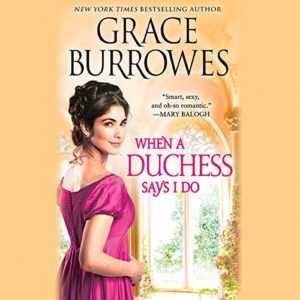Narrated by James Langton
This second book in Grace Burrowes’ Rogues to Riches series takes place about five years after the events of book one, My One and Only Duke, and focuses on Duncan Wentworth, cousin of Quinn, Duke of Walden. When a Duchess Says I Do is a quiet, tender romance between a mature, well-matched central couple underpinned by an intriguing mystery, in which the author once again exhibits her talent for writing close-knit loving families and gently understated romances.
Scholar and former curate Duncan Wentworth has spent the last few years as tutor and companion to his cousin Stephen, younger brother of the Duke of Walden. Duncan is quiet, kind, knowledgeable and well-travelled, but owing to past disappointment and something he regards as a dreadful youthful mistake, he tends to eschew personal connection. In an effort to bring him out of himself somewhat, his cousin Quinn has directed Duncan to undertake the management of one of the dukedom’s less well-run estates – Brightwell in Berkshire – and to make it profitable within a year. If Duncan can achieve that, Quinn will take over the management of the properly, freeing Duncan to return to his studies and his travels, but if not, then Duncan will continue to manage it indefinitely, whether he wants to or not. Not surprisingly, Duncan isn’t all that happy about the situation, but he’ll nonetheless do the best he can for his cousin.
He’s returning to the house one day when he stumbles across a pair of poachers who aren’t about to simply run off and leave their catch behind. Duncan is outnumbered but determined to put up a fight, when a woman wielding a pistol appears and sends the miscreants packing. Duncan has never seen her before, but her clothes, although dirty, are well made and of good material and her manners are clearly those of a lady, but when he asks for her name, she deflects and is clearly uncomfortable.
Matilda Wakefield is on the run and has been living rough for the last few weeks, most lately holing up in the gatehouse of Brightwell and living off scraps and old fruit from the garden. When Duncan offers her a decent meal and the chance to get warm, she’s unable to resist, even though she knows she should. Telling herself she’ll accept the offered hospitality and then leave, Matilda accompanies Duncan to the house and joins him for lunch, finding herself reluctantly intrigued by this quiet, compassionate gentleman who sees so much more than she’s willing to reveal.
Duncan quickly discerns that this unknown lady is a damsel in distress if ever there was one, and is instinctively moved to help her however he can. He has a wealth of writings from his many travels abroad that he needs transcribed and readied for publication, but little time to attend to them thanks to the responsibilities now thrust upon him by his cousin, so he makes Matilda an offer of temporary employment as his amanuensis. She accepts – albeit with one eye on the door and the determination to leave at the earliest opportunity.
Days stretch into weeks, and Duncan and Matilda fall into a routine of sorts, she working on his papers, he on estate business during the day, sharing a meal in the evenings, talking, playing chess and enjoying each other’s company as their slow burning mutual attraction grows stronger. Falling in love is the last thing Matilda wants or needs given her situation, but she’s nonetheless determined to leave soon – it’s imperative if she’s to avoid bringing disaster down upon the head of the man who has become so dear to her.
Both characters are keeping secrets which are not fully revealed until the second half of the book, although hints are dropped fairly early on as to the reasons for Duncan’s restlessness and disillusionment. Matilda’s situation, however, takes longer to play out, and we also get a number of scenes from the viewpoints of her father, an art dealer with whom Matilda travelled extensively, and her fiancé, Lt. Colonel Lord Parker, who is actively trying to find her – although it gradually becomes clear that his reasons are not entirely altruistic. This plotline is interesting, although it sort of peters out towards the end, and the villain of the piece is barely two-dimensional, but it’s worth pushing on through the denouement for Matilda’s wonderful dressing down of someone who should have been looking out for her and failed miserably to do so.
I really liked Duncan, a quiet, competent man who is determined to protect and care for those around him to the best of his ability. In the previous book, he was very much the voice of reason and I liked his relationship with the brilliant, mercurial Stephen, which continues here. Matilda is perhaps a little less well-defined; I appreciated that she isn’t coy about the fact she’s had lovers and enjoys sex and I liked her courage and her devotion to Duncan, but wasn’t wild about her insistence on protecting others by keeping secrets, a trope which rarely works for me.
James Langton’s performance, however, did work for me. I’ve said before that I tend to listen to Grace Burrowes’ books rather than read them these days simply because I like his voice, and his performance here is delivered with his customary skill. One thing I wondered about, however, was his choice to give Duncan a slight Scottish accent; not because it’s bad (on the contrary, it’s very good), but because a) the text indicates he’s from Yorkshire (as are the rest of the Wentworths – Quinn and Stephen both speak with Yorkshire accents) and b) in one of the later chapters, the author writes: “Duncan was a fine strapping fellow, but he had no accent …” I’ve read various interviews with narrators over the years where they talk about their dread of suddenly finding out a character they’ve voiced a certain way over several books is then revealed to have a different accent; I can only assume something like that has happened here, because Mr. Langton gave Duncan the Scottish accent in the previous book and has obviously opted to maintain consistency by retaining it here. Ultimately, it wasn’t something that impacted on my enjoyment, so this is more of a “by the way” than an outright criticism. And on the subject of accents, there are number of secondary characters in the story who hail from various European countries, all of them voiced appropriately. Mr. Langton’s portrayal of Matilda is also really good – there are none of the pitch issues I’ve criticised in the past – and he does a great job capturing Stephen’s youthful enthusiasm and Parker’s shiftiness. It’s a well-paced, expressive performance, and contributed much to the overall listening experience.
Fans of the author and narrator will no doubt enjoy this latest outing with the Wentworths.
Caz
Buy When a Duchess Says I do by Grace Burrowes on Amazon




